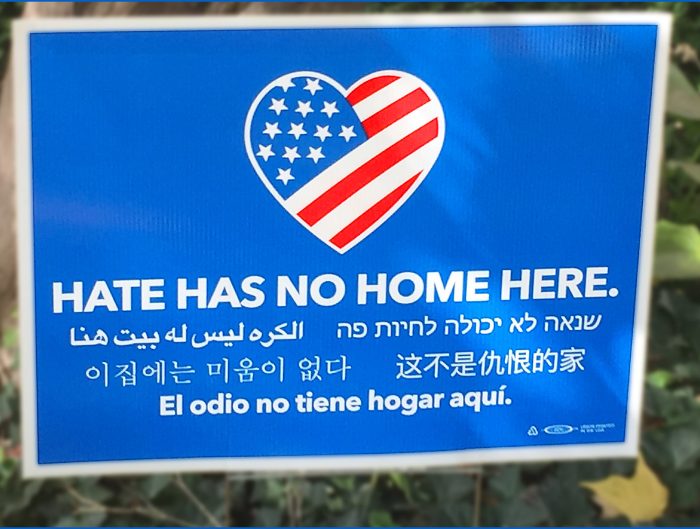“Nationalism is power-hunger tempered by self-deception. Every nationalist is capable of the most flagrant dishonesty, but he is also–since he is conscious of serving something bigger than himself–unshakably certain of being in the right.” – George Orwell, Notes on Nationalism
I’ve always been uncomfortable with love-of-country, for it so frequently entails the belief that, as George Bernard Shaw wrote, your nation and its residents are “superior to all others [merely] because you were born it.” Even in elementary school I would refuse to stand for the Pledge of Allegiance, though I could not then have articulated why. Perhaps it’s something I got from my mom, who grew up under the Soviet Union’s tyranny of imposed patriotism; or that, as an atheist, I cringe at the words “under God” (the original pledge did not include this phrase; it was added in 1954); or perhaps it’s simply that I abhor being told what to do.
The more I read about American history–slavery, lynching, support of dictatorships in Haiti, Chile, South Vietnam, Egypt, and El Salvador, to name a few examples–the harder it became to swallow the sanitized story we learned in school about us as the shining city on a hill. Nevertheless, in the wake of 9/11, I felt a sense of pride in the flag: despite our flaws, we are still a democracy, still an advocate of freedom, still a model for the world, still a generous people. So while I didn’t cover my house in bunting or my car in patriotic stickers, I understood why others did.
Then came the invasion of Iraq, the endless War on Terror, extraordinary rendition, enhanced interrogation, Guantánamo Bay, domestic spying, unchecked drone strikes, and, as I discussed last week, the you’re-with-us-or-against-us attitude. As the years passed, I noticed that those waving the flag most fiercely often believed the least in reasoned debate–that they were more likely to espouse xenophobia.
But it wasn’t until Donald Trump’s candidacy, which wrapped its cruelty, lies, and hatred in the flag, that it felt to me as though the Stars and Stripes were truly deviating from their original meaning (“red symboliz[ing] hardiness and valor, white symboliz[ing] purity and innocence, and blue represent[ing] vigilance, perseverance and justice.”) Where once brandishing the flag was something anyone might do for her or his own reasons–the immigrant who came here for freedom and opportunity, say, or the poor farmer that because a successful entrepreneur–in Trump’s America, doing so became associated with a particular brand of nationalism: one predicated on a macho, insecure, tough-guy intolerance.
Nowadays, when I see a car festooned with a giant flag, I immediately associate it with the far-right, to the point that patriotism seems coincident with bigotry and even a lack of support for the fundamentals of democracy, like voting rights. Put another way, the Stars and Stripes now almost feel like a hate symbol to those of us who have watched the nation reach the precipice of fascism. (Just this past week we learned that the right-wing attorney John Eastman wrote a six-point plan for how Mike Pence could overthrow a free and fair election and install Trump as a dictator.)
In his Farewell Address to the People of the United States, George Washington warned us to “to guard against the impostures of pretended patriotism.” I couldn’t help but think of that warning yesterday when, walking through a Home Depot parking lot, my dad and I saw a pickup truck with a giant flag mounted on the back. We instantly assumed that this was a member of the far-right, and sure enough, the comically oversized vehicle also sported stickers with the Confederate flag, that don’t-tread-on-me snake thing, the NRA logo, anti-vax sentiment, and some gibberish about CNN being fake news.
While it is profoundly sad and distressing that, for some of us at least, the way in which many citizens now brandish them has made the Stars and Stripes feel like a thin veil for hate, there is another way to look at it. In the 21st century, as we face so many crises that can only be solved through international cooperation, I posit that it’s time to reconsider the whole notion of patriotism and root out nationalism entirely.
Rather, we must ask what it would mean for us to first consider ourselves citizens of the world, responsible for all that lives on this beautiful, fragile planet, and only second residents of a particular nation with a particular history and culture. Might we then be in an arms-race to vaccinate the world against COVID-19 and end our use of fossil fuels, instead of accumulating more and more weapons of war and accelerating deforestation and greenhouse gas emissions?
Seeing as the current philosophy underpinning domestic and international relations has not exactly begotten the peace, prosperity, and justice that most of us long to inherit and pass on to our children, I for one am quite willing to take a new tack.




Leave A Reply